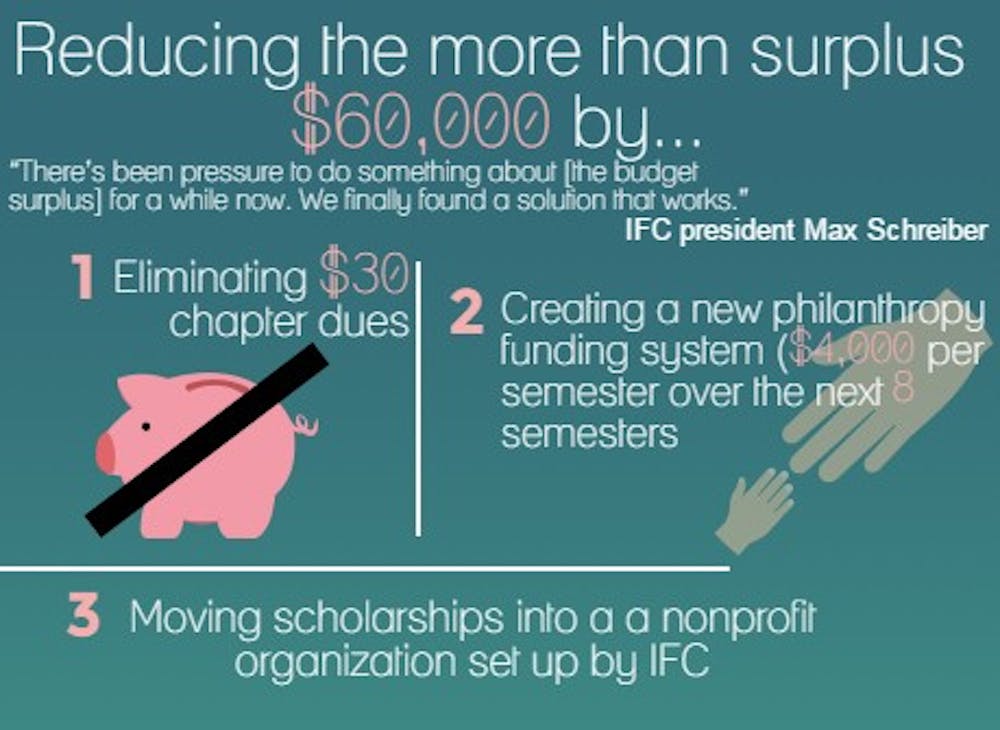While Duke Student Government maintains its large surplus fund, the Interfraternity Council has decided to repurpose extra cash.
To reduce its surplus—which reached more than $60,000 this year—IFC decided to eliminate chapter dues, create a new philanthropy funding system and move its scholarship funding into a new entity. IFC president Max Schreiber, a senior and columnist for The Chronicle, explained that the changes resulted after three years of deliberations within the council.
“There’s been pressure to do something about [the budget surplus] for a while now,” he said. “We finally found a solution that works.”
Schreiber explained that the surplus is the result of IFC growing in size— which has resulted in increased dues from members—and cutting back on spending during recruitment events.
Recruitment events will now be the council’s sole source of revenue with the elimination of chapter dues—currently $30 per member of each chapter—he said. Each student who chooses to go through the IFC recruitment process in the Spring pays a one-time fee of $75.
Getting rid of chapter dues will help chapters who choose the 20/exec standard housing option, Schreiber explained. Housing, Dining and Residence Life announced in September that selective living groups can choose to meet the 30/10 housing guideline—which states that 30 percent of a house’s occupants must be upperclassmen and 10 percent must be seniors— or opt for the 20/exec standard, in which upperclassmen make up 20 percent of the house and three of six HDRL-designated executive members live in section. However, opting for the 20/exec standard results in a loss of house council funds.
Because IFC chapter dues annually cost approximately the same amount as a chapter’s house council funds provide, eliminating chapter dues will not cost chapters selecting the 20/exec standard much. Schreiber noted that the decision will prevent chapters from feeling pressured to chose a housing option based on finances, which is especially important because about half of Duke’s 17 IFC chapters are choosing that option.
“It gives chapters the flexibility to decide what works best for them,” he said.
Another measure to reduce IFC’s surplus is the new philanthropy funding system that will allocate $4,000 per semester over the next eight semesters to invest in the service initiatives of its members. For instance, Schreiber explained that if a member is coaching a junior league basketball team and needs money for his players’ jerseys, he can apply for funding from the IFC.
“We’re not only investing in service but in the service of our own guys,” he said. “We hope it leads to more interest in service.”
The third effort to reduce the council’s surplus is the creation of IFC scholarships that will now be distributed from a nonprofit organization, instead of the council’s account in University Center Activities and Events. Scholarships will be merit awards for one member of each chapter on campus to cover part of the member’s mandatory fees to a chapter’s national organization each semester.
Senior Jonathan Kersky, IFC executive vice president, explained that moving the scholarships to a new nonprofit will facilitate easier transactions.
“We don’t have to worry about the difficulty of going through UCAE red tape to get our members money that they need to be able to afford their dues,” Kersky said.
He added that this will make it easier for alumni to donate to the scholarship funds because they will not have to worry about their money being tied up with UCAE.
Schreiber noted that because this transfer process will take time to set up, IFC is deferring its scholarship funds for this semester to the Spring 2016 budget.
Although the philanthropy funding system is a temporary initiative, the elimination of IFC chapter dues could remain in place even once the surplus budget is reduced, he added, explaining that IFC finances may be self-sustainable with just recruitment fees.
Kersky noted that the progress of the plan will be evaluated in four years to determine if it was effective.
“The next generation of IFC leaders will have the opportunity to redefine the policy as it fits their needs,” he said.
Get The Chronicle straight to your inbox
Signup for our weekly newsletter. Cancel at any time.

